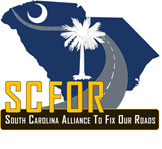To maintain and improve South Carolina’s extensive network of roads and bridges, the state depends on federal funding and state revenues from the motor fuel user fee and other driver/vehicle-related fees.
Federal Funding
Federal Funding plays a critical role in funding our transportation program. It accounts for a significant amount of South Carolina’s transportation budget. The primary funding source for federal highway investment in the United States is the excise tax on motor fuels.
- Federal Excise Tax on Gasoline: 18.4 cents per gallon
- Federal Excise Tax on Diesel: 24.4 cents per gallon
Fuel taxes are dedicated to the federal Highway Trust Fund (HTF). Other revenue sources dedicated to the HTF come from taxes on tires and heavy vehicles (trucks). Due to decreased buying power of fuel tax revenues over the years, the fund has been dependent on revenue transfers from other sources to remain solvent.
In 2021, Congress passed the Infrastructure Investment & Jobs Act (IIJA) which reauthorized surface transportation funds through 2026 and increased federal funding to states. Thanks to the IIJA, South Carolina is receiving approximately $250 million more in federal formula funding (roughly $1 billion, up from $750 million) thanks to the IJA. Revenue sources for the IIJA come from various sources including general funds.
State Revenue Sources
South Carolina’s transportation infrastructure revenue sources come from state motor fuel user fees and other vehicle-related fees. State revenue sources are used to match federal fund requirements, and they are critical to funding maintenance and repairs.
- Motor Fuel User Fees: The primary source of state revenue is the 28.75 cents per gallon motor fuel user fee (gasoline and diesel).
- Biennial Registration Fees: $16 of the biennial registration fee for passenger vehicles.
- Registration Fees for Alternative Vehicles: Biennial registration fees on alternative vehicles ($60 for hybrids; $120 for electric vehicles).
- Infrastructure Maintenance Fee: Fee imposed on purchasing a vehicle or transferring vehicle registration from another state. The fee is 5% for in-state purchases (capped at $500) and $250 for out-of-state transfers.
- Road Use Fees on Motor Carriers: Commercial vehicles over 26,000 lbs. pay a “road use fee” to the state. This fee is based on property tax formulas and captures revenues from interstate trucking operations. The majority of these fees (75%) go to counties and the remainder (25%) is dedicated to the Infrastructure Maintenance Trust Fund.
- DMV Fines and Fees: Many fines and fees related to licensing and titling requirements are allocated to the SCDOT.
- Other Revenues: The SCDOT also receives revenues from fines, tolls, permits, and some general funds.
The Infrastructure Maintenance Trust Fund was established by Act 40 of 2017. All revenues deposited into the fund MUST be used exclusively for repairs, maintenance, and improvements to the existing transportation system. Learn more about these revenues and how they are being spent here.
Local Revenue Sources
County Transportation Committees
A portion of state fuel taxes (3.99 cents from gasoline user fee) goes directly to counties via C-Funds allocated to County Transportation Committees (CTC).
CTCs are a partnership between the state and the counties to fund local transportation projects and improvements to state and county roads and city streets. Generally, members of the CTC may be appointed by their respective legislative delegation or governing bodies at the local level. The CTC is responsible for determining how money is spent across the county.
C-Funds are allocated based on a formula that takes into account land area, population, and rural road mileage. By law, CTCs must spend at least 33 percent of their C-Funds on the state highway system for construction, improvements, and maintenance.
Local Option Sales Taxes
Counties are authorized to impose various local option taxes in addition to the 6 percent sales tax imposed by the state. The two local option taxes that can be used for roads are the Capital Projects and the Transportation sales tax.
- Capital Project Sales tax: This method has proven to be very popular and is the most widely used. Funds can be used for a variety of capital needs, including roads and bridges.
- Transportation Sales Tax: This method is all-encompassing. It provides funding for everything from roads and bridges to mass transit and greenbelts.
In order to impose either of these taxes, voters must approve the measure by a referendum, which clearly outlines when the tax begins, ends, and the projects that will be included. If a county wishes to reimpose, they may bring another referendum before voters.
Local option sales taxes are a way to supplement state funding, and they have proven to bring improvements to areas much faster than waiting for projects to appear on a list at the state level.

